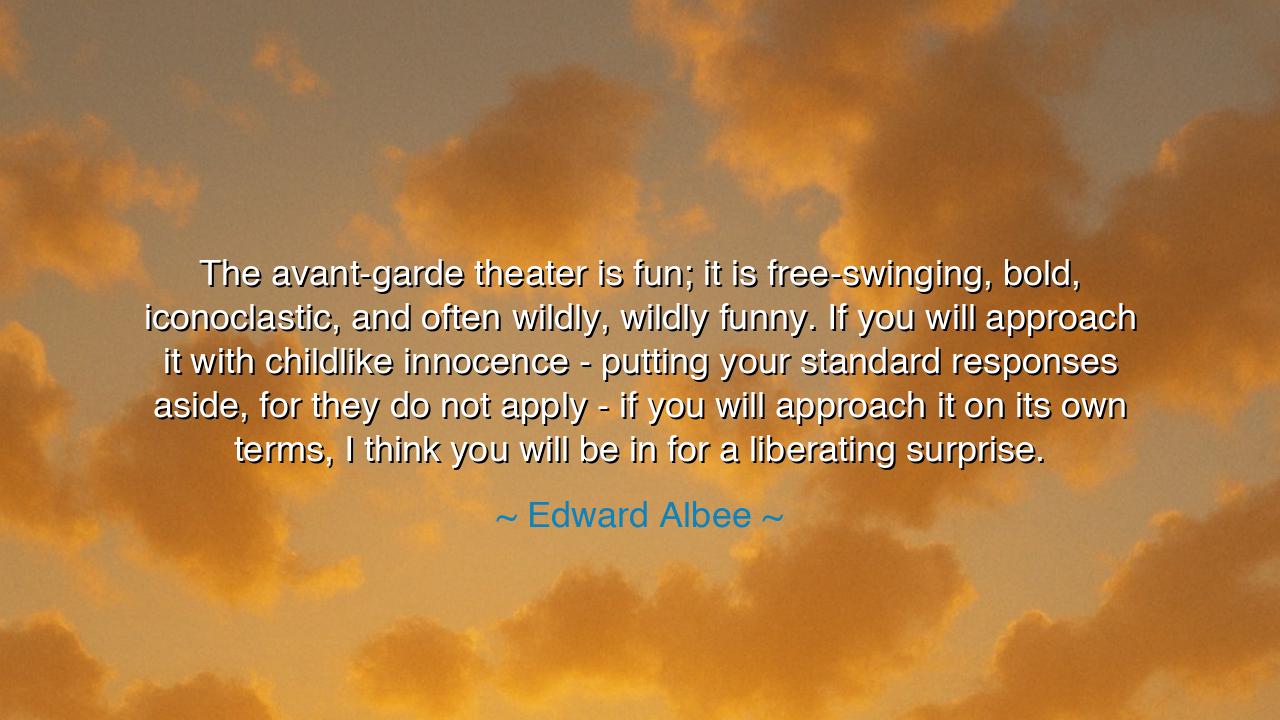
The avant-garde theater is fun; it is free-swinging, bold
The avant-garde theater is fun; it is free-swinging, bold, iconoclastic, and often wildly, wildly funny. If you will approach it with childlike innocence - putting your standard responses aside, for they do not apply - if you will approach it on its own terms, I think you will be in for a liberating surprise.






The visionary playwright Edward Albee, whose words cut through illusion like a blade through silk, once said: “The avant-garde theater is fun; it is free-swinging, bold, iconoclastic, and often wildly, wildly funny. If you will approach it with childlike innocence — putting your standard responses aside, for they do not apply — if you will approach it on its own terms, I think you will be in for a liberating surprise.” In this declaration lies a lesson not only for lovers of the stage, but for all who seek to understand life itself. Albee speaks of art, yes — but beneath his words runs a deeper current: an invitation to openness, to abandon the armor of expectation and rediscover the wonder that once made the world new.
When Albee calls avant-garde theater “free-swinging, bold, iconoclastic,” he is describing not just a form of performance, but a state of mind. The avant-garde is the realm of those who dare to break patterns, who defy the comfortable structures of the ordinary, who look at reality and say, “It could be otherwise.” In such art, reason gives way to rhythm, certainty to curiosity. It is wild, unpredictable, and alive — and because it is alive, it often confounds the rigid and delights the free. To the one who demands explanation, avant-garde theater seems nonsense; but to the one who listens with the heart, it becomes revelation.
Edward Albee, who gave the world Who’s Afraid of Virginia Woolf?, was himself a craftsman of disquiet and laughter. He believed that art must unsettle, that truth often arrives wearing the mask of absurdity. In his plays, humor and anguish walked hand in hand, just as in life. When he says the avant-garde can be “wildly, wildly funny,” he does not mean it mocks seriousness — he means it reveals the comedy hidden within existence itself. The laughter it inspires is not cheap amusement, but the laughter of awakening, of realizing that the boundaries of what we call “normal” are as fragile as glass. Such laughter frees the soul. It is fun, not because it is easy, but because it restores to us the joy of seeing without fear.
The ancients understood this wisdom long before Albee put it into modern words. The philosopher Heraclitus, the dark thinker of Ephesus, once said, “The way up and the way down are one and the same.” To those who cling to reason, his words seemed madness — yet he was pointing to the same truth that Albee would later find in theater: that contradiction, surprise, and paradox are not chaos, but the foundation of understanding. The childlike mind, as Albee urges us to cultivate, can embrace paradox without fear. A child laughs at the strange, wonders at the unexpected, and delights in discovery. It is this spirit — pure, curious, unguarded — that allows the viewer to find liberation in the avant-garde.
There is a story of Pablo Picasso, the painter who shattered form to rebuild beauty. When asked by an adult why he painted faces with two eyes on one side or bodies made of angular shards, Picasso replied, “It took me four years to paint like Raphael, but a lifetime to paint like a child.” The same truth breathes in Albee’s words. The avant-garde — whether on the stage, the canvas, or in life — demands that we see with the unspoiled eyes of youth. It asks us to suspend judgment, to stop labeling what we do not yet understand, and to let art — and experience — move through us freely. Only then, says Albee, do we experience the “liberating surprise” — the moment when confusion turns to illumination, and absurdity to truth.
But Albee’s insight stretches beyond the theater. His call to “approach with childlike innocence” is a call to live differently — to meet the unknown not with cynicism, but with wonder. In our daily lives, we often close ourselves to mystery, measuring every experience by familiar standards. We become trapped in the theater of predictability, rehearsing the same roles, speaking the same lines. Yet the world, like the avant-garde stage, is alive with improvisation. If we meet it with curiosity instead of control, if we put aside the “standard responses” that confine our vision, life itself can become art — unpredictable, strange, and yes, wildly funny in its contradictions.
The lesson, then, is this: dare to unlearn. When confronted with the unfamiliar — in art, in people, in life — resist the urge to judge or retreat. Instead, step forward with innocence. Ask not, “What does this mean?” but “What does this make me feel?” Seek the laughter hidden inside confusion, the freedom concealed within the absurd. For as Albee teaches, liberation does not come from control, but from surrender — from allowing the world to astonish us once more.
So, my child, remember Edward Albee’s words when you encounter something strange or uncomfortable, something that challenges your old truths. Let it bewilder you. Let it shake your certainty. Approach it as a child approaches the first snowfall — with eyes wide open, with wonder unspoiled. For those who do not fear the unfamiliar will find that the world itself is an avant-garde theater — bold, iconoclastic, and wildly, wildly funny — and to watch it with innocence is to discover, again and again, the joy of being alive.






AAdministratorAdministrator
Welcome, honored guests. Please leave a comment, we will respond soon